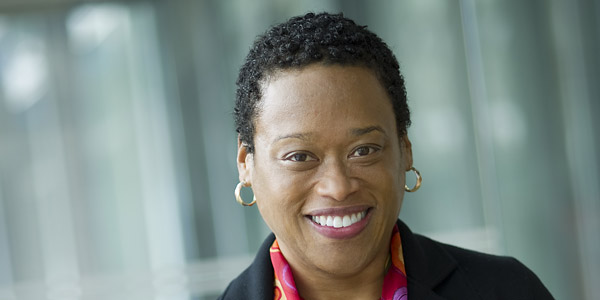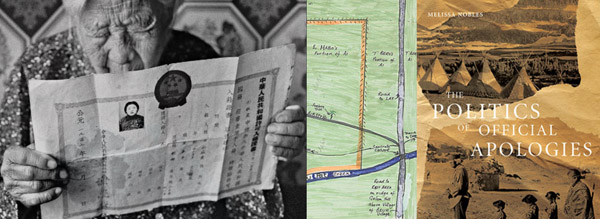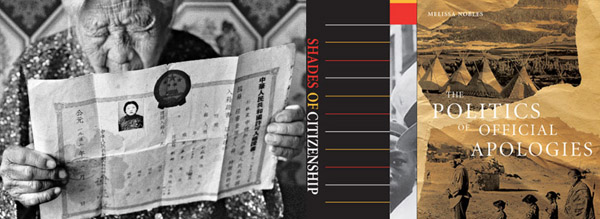3 Questions
Melissa Nobles on advancing racial and restorative justice
Understanding the past is a source for social innovation in our own time.

“Filling in history and finding analogies to our own times may give people a greater understanding of why black Americans see events as driven by race, and oftentimes white Americans do not. It is a shared historical burden."
— Melissa Nobles, Chancellor of MIT; Professor of Political Science; Dean of MIT School of Humanities, Arts, and Social Sciences (2015-2021)
April 3, 2015 — The Justice Department’s March 2015 report on racist policing in Ferguson, Missouri was but the latest episode in a series highlighting the unsettled and unsettling issue of racial justice in the U.S. From Trayvon Martin to Michael Brown to Eric Garner to Tamir Rice, headlines have seized public attention, and sparked public protests. “Hands up, don’t shoot,” “I can’t breathe,” and “Black Lives Matter” are more than catchphrases for a growing chorus of Americans concerned not only with current inequities, but with their origins and possible remedies.
Melissa Nobles, Professor of Political Science, a former Head of Political Science at MIT, and since July 2015, the Kenan Sahin Dean of the MIT School of Humanities, Arts, and Social Sciences, researches historical injustices in democracies, and how societies confront histories of racial and ethnic injustice. Her current work documents racial violence in the American south during the period of 1930-1954, a time when Jim Crow rule permitted and even encouraged persecution and murder of black Americans by both citizens and legal authorities, and allowed little recourse to justice.
MIT SHASS Communications spoke with Nobles recently about what her research suggests for current efforts to advance civil rights in America, including possibilities for restorative justice.
•
Q. You have written that U.S. civil rights advocates have, until recently, avoided focusing on issues of criminal justice out of concern that doing so "would diminish the political and moral force of demands for full inclusion." Can you tell us about the circumstances that motivated that concern, historically.
A. Following the Civil War, and during Jim Crow, part of the claim against granting blacks citizenship was that we were somehow morally deficient. We might have rights by birth, but, the claim went, we could not be treated as full citizens; being born in the U.S. wasn’t enough, we were said to be undeserving. So, in the struggle to enjoy our full rights of citizenship, including the right to vote, we had to present the case in an exceedingly upright manner. We wanted the focus to be solely on the legitimacy of our demands, and didn’t want someone pointing at any supposed deficiencies as a way of undercutting these demands.
For instance, in 1954, the NAACP chose Rosa Parks to be a spokesperson for desegregation, rather than another woman who had worked a long time for the NAACP but had a child out of wedlock. It was an issue that could have been used against us, and advocates needed a representative with impeccable moral bearing.
So while civil rights advocates did defend people mistreated by the police, they kept it quiet. The emphasis was on voting rights and desegregation of schools, because dealing with the issue of criminality was seen as a way of giving ammunition to opponents of black rights.
But, of course, demands for political rights should be indifferent to notions of presumed criminality or innocence, and the establishment of whether someone has committed a crime should be subject to due process. We can’t advocate for fairness in criminal justice while holding one hand behind our back; we can’t argue fully for civil rights and not take seriously criminal injustice, and the way blacks are treated by the criminal justice system. The mistreatment of blacks and Latinos is itself a civil rights issue. At this point in the 21st century, we can no longer afford to ignore this because too many lives continue to be destroyed by the criminal justice system.

"Whatever our background, a fair and viable justice system must be one of the bedrocks of American democracy."
Q. With the public outcry over Ferguson and other high profile cases of lethal force used by police against black men, do you see the emergence of a new and potentially transformative movement for equal justice?
A. Advances will likely be quite incremental but important. People will pay more attention to the actual practices of police. Some scholars are now looking at policing and the prison system as American institutions that need to be studied in the same ways we study Congress, the presidency and the courts. In the U.S., there’s a general belief that police forces exist to protect citizens, uphold law and order, and that they should be fair and apply equal treatment. Yet these recent cases have revealed to the broad American public that police behave very differently in minority neighborhoods than they do in wealthier neighborhoods.
The explanation we hear for this is that police operating in what are perceived as high crime neighborhoods feel threatened, because citizens there don’t trust them. If police overreact — so goes this explanation — it can be justified. There is a reservoir of stereotypes that signals “the black person was a criminal, or not well intentioned, or up to no good.” It is a wide reservoir we can all draw on, and one in which we are all implicated. But as a practical matter for black citizens, this means not trusting you’re going to get the benefit of the doubt. That’s what’s missing. The outcome police should want for any encounter is to preserve life. But I can’t say we feel safe when we see police officers. Black lives don’t seem to matter as much as white lives.
Until recently, most of us would give an understanding nod when a cop said, “I felt threatened.” This may be now changing in the 2000s. The educated, white kids of Occupy Wall Street witnessed state coercion. They experienced police excesses. And since 9/11, the war on terror has meant secret surveillance and the use of tanks by many local police departments, including in Ferguson. This militarization of the domestic police force and other perceived abuses of state authority might give the issue of police brutality against blacks a different kind of framing.
This shift in perspective may not signal the start of a large social movement, but it may help trigger a closer monitoring of police departments in many communities nationwide. For black citizens, life in Ferguson has been like living in a police state. The excessive policing there bears no resemblance to the conditions any American would view as living in a free society. The Department of Justice is calling out these problems, but change in communities like Ferguson will also require greater political participation, especially voter participation.

"There is trauma if a family member is killed by a citizen, and that person goes unpunished. The family sees injustice for which there is no remedy. For families where someone is killed by police, that leads to distrust of institutions."
Q. What light does your own scholarship on injustice and reconciliation shed on the current national debate about racial justice?
A. The way police treat blacks today, and the high incarceration rates of black men deeply resonates with what’s happened in the past. Some people describe our current conditions as the “new Jim Crow.” But if we are to accept this moniker, we have to better understand the old Jim Crow. My research contributes to the project of gaining more understanding about that period of American history.
In concert with the Civil Rights and Restorative Justice Program, at Northeastern University School of Law, I am compiling an archive of racially motivated homicides in the former states of the Confederacy from 1930 to 1954. It was a time when excessive force against black citizens was routine, and the legal system failed to deliver justice more commonly that is probably believed. The ramifications of these murders have been far reaching. There is trauma if a family member is killed by a citizen, and that person goes unpunished. The family sees injustice for which there is no remedy. For families where someone is killed by police, that leads to distrust of institutions.
That’s one similarity to our own times. Another is that Jim Crow laws and norms effectively deputized white southerners to police the behavior of black people. If a black man didn’t remove his hat, or if he talked to a white woman, that could end in death. The lingering legacy of these norms can be seen today. George Zimmerman didn’t know what Trayvon Martin was doing in his neighborhood, and felt empowered to pursue him. Of course, as we now know, Trayvon was visiting his father.
In at least some of the cases I’ve been involved with, reconciliation and restorative justice is possible. We have been able to offer families the real stories of the deaths of their loved ones. Recently we told a family that their grandmother had been murdered by police who suspected she was involved with selling moonshine. She’d been accused by a neighboring farmer, but never had a chance to prove her innocence because she died while in custody. Her grandchildren were both sad and thankful to learn the circumstances of her death after so many years.
It can make a huge difference to families, because their story is finally acknowledged. I tell them they’re not alone, and it gives them comfort. We talk about what good has come out of the experience, how it may better explain what’s gone on in their own lives, and we take stock of how things have changed.
Filling in history and finding analogies to our own times may give people a greater understanding of why black Americans see events as driven by race, and oftentimes white Americans do not. It is a shared historical burden. Whatever our background, a fair and viable justice system must be one of the bedrocks of American democracy. So, I dare to hope that knowing more about our past, and understanding it, will help us make better decisions moving forward, as a people.
Suggested links
Melissa Nobles website
Melissa Nobles named Dean of MIT SHASS
Books and Publications | Research
MIT SHASS | Department of Political Science
Taking Full Account of the Past, MIT News, May 2013
3 Questions: Melissa Nobles on the U.S. Census, MIT News, April 2010
Response to “Ferguson Won’t Change Anything. What Will?”
Boston Review, January 2015
“Face Up to the Violence of Jim Crow”
New York Times, January 2014
Civil Rights and Restorative Justice Program
Restorative justice
Interview prepared by SHASS Communications
Editorial team: Emily Hiestand (Communications Director), Leda Zimmerman
Photograph of Melissa Nobles: Stuart Darsch
Published April 3, 2015